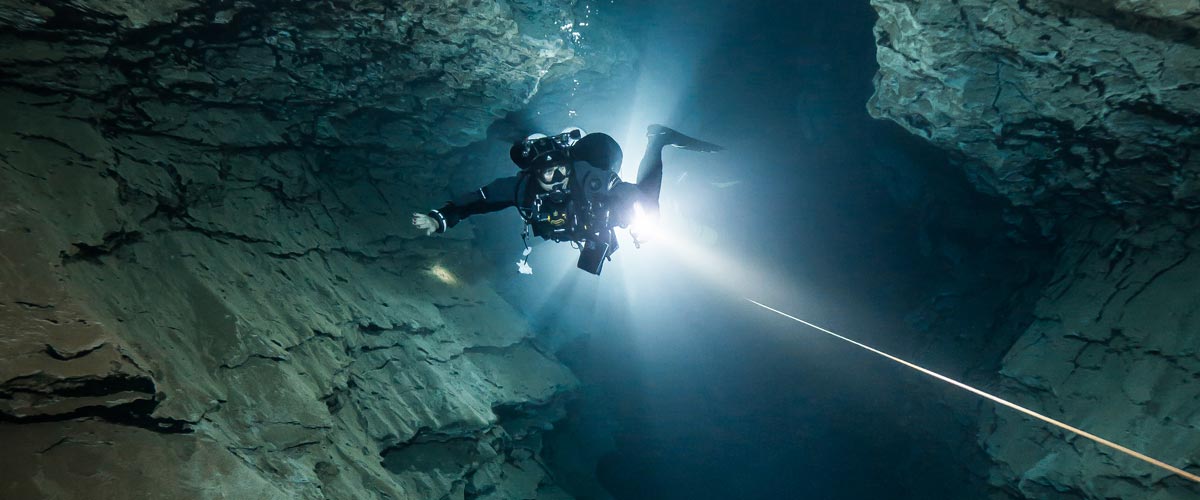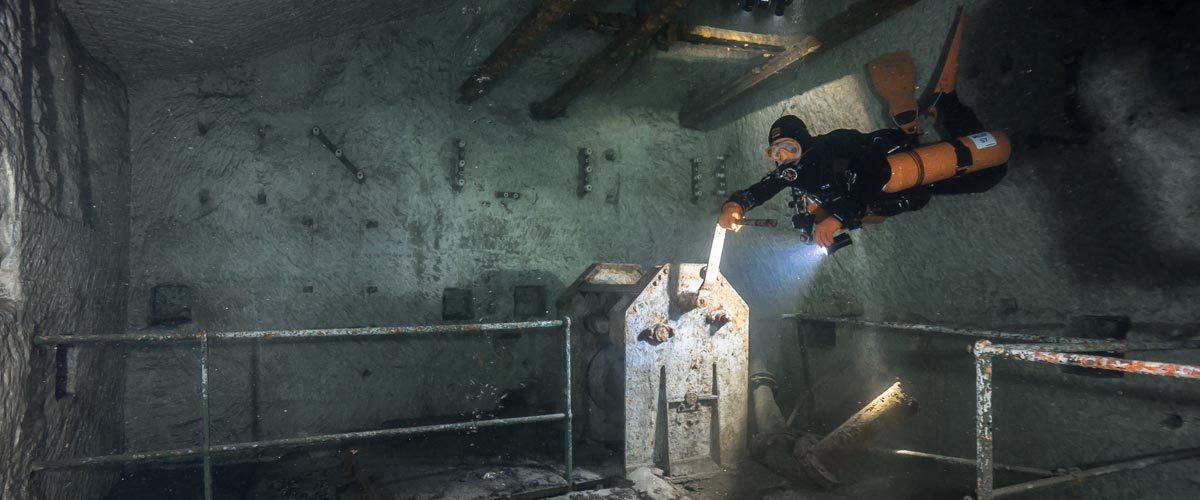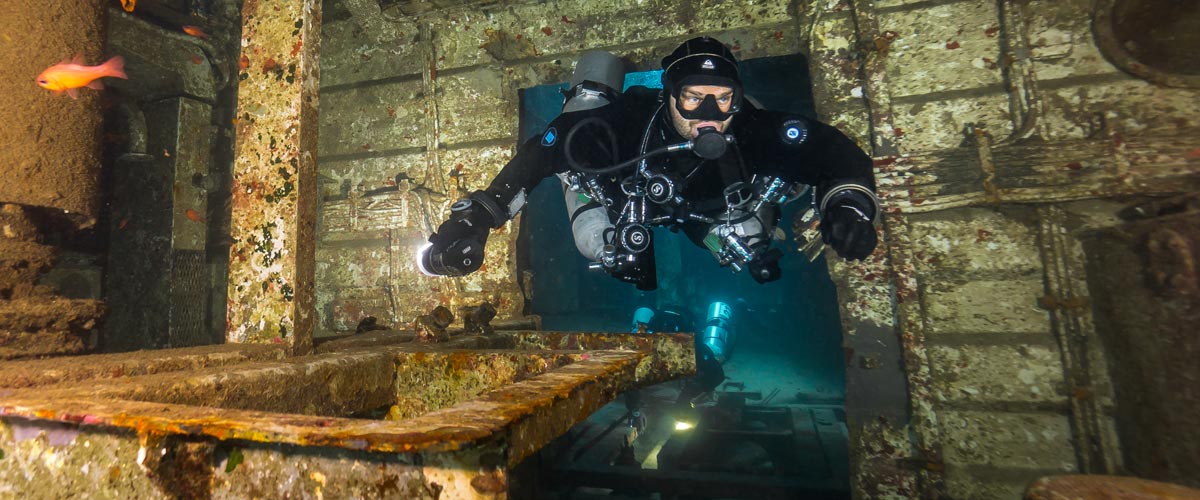Dive Training Blogs
Joining BSAC and my first Dive Show
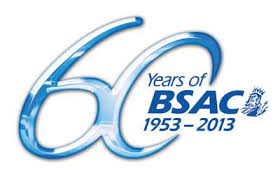
There was the initial search for a worthwhile hobby. Something to counteract occupational stress (as a probation officer and child protection social worker) and to avoid ‘Eastenders.’ If I wanted to watch people with funny accents arguing I could go to work.
I am an older dad aged 61 with a 13 year old son. Preferably, I wanted something we could both do. This was harder than it sounds as he is better and faster than me at most things now. He is also quite good at silences, grunts or gazing with disdain when I sing along to my radio favourites.
However, as a semi responsible parent I needed to get him away from stealing another virtual car with a virtual gun on his Xbox.
I always enjoyed trips to natural places. Fishing in the south west of Ireland (Cork) or walking holidays in Scotland. Last year a trip to the Deserts of Oman. Scuba diving has always attracted me. However, as a mortgage slave who lost money in the property crash, the initial starts up costs were daunting. I took the plunge and after a few on-line false starts, turned up to my local Club (Chadderton).
We have a dive pool at Oldham baths. I dragged my son along to where we train. Blank faces greeted me as (through me not reading the e-mail properly) the club were not yet expecting us.
Nevertheless they managed to get the kit together and, over the next three weeks we enjoyed the ‘try dives.’ Remaining somewhat apprehensive of my lad’s staying power, we signed up and I paid the BSAC fees (keeping the receipt in case he develops a conscience, when earning, at the age of 18).
Chadderton has some 40 members and has its own club house so the informal supportive atmosphere was inviting. Although all were welcoming, being a talented observer of life, I noted the subtle contrast between the confident appraisal of the older hands and the ‘bright and breezy’ nods of the greener divers. What I would call the consciously competent and the incomers.
After the three ‘try plunges’ and four practical dives (in the local dive pool) I was ready to start buying gear. Fortunately, the BSAC dive show was coming up. Ged and Steve, who had been my main instructors, were attending to represent the branch. I hardly knew the correct terms for the items I needed to survive in a liquid element. I was never any good at shopping. Consequently, their guidance would be crucial if I wanted to avoid coming away with a tank top, dive scooter and a mortgage on a state-of-the-art rebreather.
As the weeks passed, I became marginally more aware of dive speak etiquette. For example, never use the ‘F’ word- ‘flipp**’ but ‘fins’ on all occasions, especially when addressing the ‘old hands’ at potato pie suppers.
The day of the dive show arrived. I desired a ‘buddy commando’ vest but, with help (from instructors, hard bargaining and credit card), I managed to purchase similar vest, fins and regulator, all for £515. Better start saving for the dry suit now.
The dive show at the NEC was a revelation. I had never been there before preferring to spend my leisure time in the great outdoors rather than the greater outdoors. The show area is, in effect, an extension of the airport. It is a 1970’s version of what the future will look like complete with monorail, ATM’s that charge £2 for their use and futuristic pasties. They must be transported from the future as one cost me £3.75.
However, the people I met were great. I am used to engaging with people with multiple substance misuse problems (SMS to you engineering types.). While you cannot generalise, it is positive to have time off on occasion with people who get their highs from nature. All the people I met were a pleasure to talk with (all except the server of the full breakfast at the Wetherspoons, who refused to smile or provide top-up coffee as advertised in magazine, on the grounds we were in the terminal).
For example, Julio with his red sea charter Liveaboard, offered all inclusive (for 8-unfortunately without alcohol-‘www.deepdarksafari.com’) for £300 per week. It costs £114 a night in Blackpool – but then again you have the lights and there is a wreck off the north pier!
There was the La Herradura dive school near Malaga. I greatly enjoyed talking with the ‘oceanaddicts’ representative who runs out of Kinsale, Southern Ireland. I know the area with its simple accessibility for raw nature and fantastic bounty of the seas.
The most satisfying (although selfish) experience occurrred when Ged and Steve took time off to wander the exhibits (or that’s what they told us!) Paul and I were on hand when the BSAC photographer took our photo and we were rewarded for our eternal vigilance by it being the lead photo on the BSAC website.
However, the most exciting meeting was with Monty Halls who acts as an inspiration for his commitment, presentation and engagement with wild places. We were lucky enough to have our picture taken with him.
In the hotel I accessed Ged’s facebook comment ‘me dogs are barking’ and could not agree more. A tiring but amazing weekend that makes me look forward to my first ‘outside’ dive. I cannot wait to try out my new equipment and pleased that I had chosen a hobby that keys into nature and offers a way of life.
Blogs
Intro to Tech: What is it about?
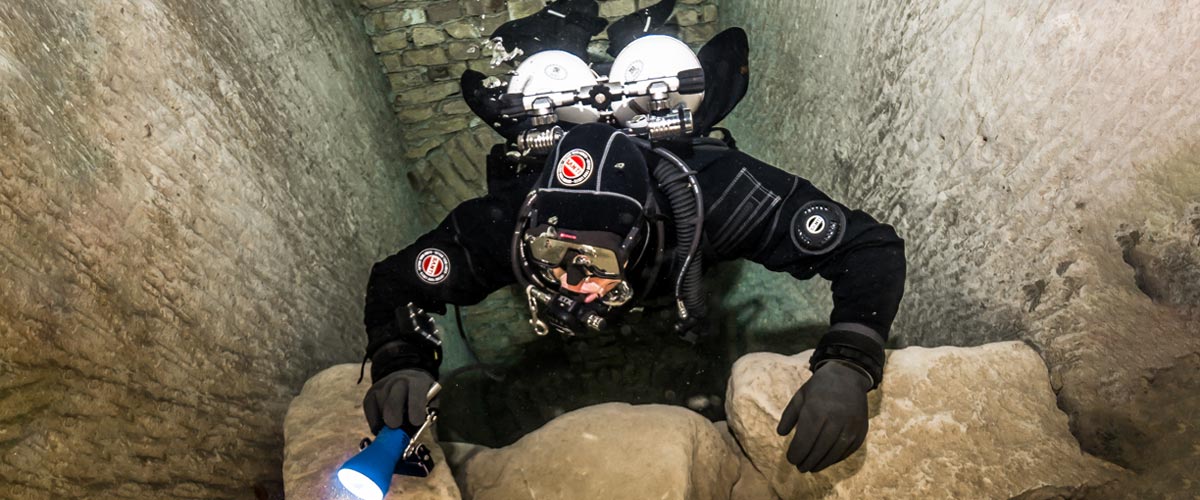
Article by José Pablo Mir
Pictures by Cezary Abramowski
The world of technical diving is exciting. It opens the door to new sites, depths, and bottom times. More importantly, it opens our minds to a new way of planning, facing, and experiencing dives, even those not purely technical.
Becoming a technical diver is a process, and like in other aspects of life, we should find the proper entry point that suits us best based on our knowledge and experience. The Introduction to Technical Diving course from TDI -the world’s largest and most recognized technical diving teaching organization- is the best option for divers who have yet to gain experience in the fundamental aspects of this new practice. The course’s content and its embrace of new techniques and technologies make it possible to acquire a solid foundation to learn and gain experience in this practice properly.
Becoming a technical diver is not something that happens overnight, whether deciding to become one or receiving a certification card stating we are now technical divers. It is a slow process extending farther away than any introductory course. It requires effort and dedication. But it will bring us satisfaction from day one -or two.
It is a matter of mentality
First, we must understand and accept that technical diving, involving greater depths, longer bottom times, exotic gases, virtual or real ceilings, and more, comes with higher levels of risk than the sport diving we have been practicing until now.
Although this discussion usually starts with a warning about risks, as I’ve done in the previous sentence, our practice is not a game of chance.
Technical diving is a rational activity that requires maturity and good judgment, and we will put everything into ensuring that each dive is a successful one -meaning we return from it safe and sound. With this understanding, we will strive to establish a mental attitude more aligned with our practice and its realities.
This new “technical diver” mindset we will develop will lead us to be more cautious in our executions, more analytical in our plans, more rational in our strategies, and more detailed in our procedures.
Experience will keep teaching us to know ourselves better, to keep our anxiety and other emotions under control, and to manage our impulses. Over time, our senses will sharpen, and we will be more attentive to the particulars of the situation we find ourselves in.
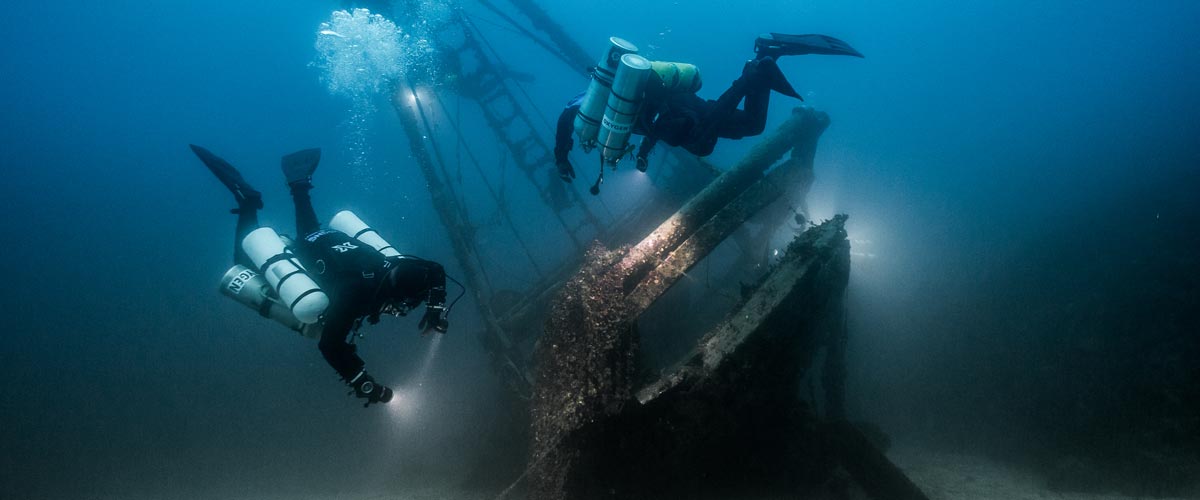
Strategies and procedures
Our strategies, those broad guiding lines tracing the path to follow, from how to approach planning to where, with what, and how we are willing to get there, will be more specific and more practical. Not because they magically become so, but because we will consciously and deliberately frame them that way.
We will establish clear, concise, and realistic procedures. Not only for the undesirable situations that may present themselves but also for those that are part of our dive objectives.
Even though, as technical divers, we often use equipment different from what we were previously accustomed to, it is essential to note that the gear does not make the diver. In a way, we could consider such equipment as the necessary tools to implement what our goal seeks to achieve, according to our strategies and procedures.
Technique plays an important role
We must put our greatest effort into learning and perfecting the different techniques we will be acquiring. Buoyancy, trim, propulsion, cylinder handling, deploying DSMBs and lift bags, valve drills, and more are essential skills we must begin to master to progress in our art. What we cannot do, when we need to do it, can harm us.
Our techniques must be effective and achieve the purpose for which they were devised. But they must also be efficient and require the least resources possible, including the time they take and the effort they demand. Effectiveness and efficiency will prevail over beauty and other considerations that may come to mind, although none of them should be mutually exclusive. A technique executed efficiently and effectively tends to have an inherent beauty.
Refining techniques is a lifelong mission. Some of them will be easy to master from the go; others, on the other hand, will be our life mission and will require many repetitions just to resemble the idea we have in mind of how they should be executed.
We must consider the environment
Our learning, the needs and musts of the practice we engage in, the experience we gradually gain, our strategies and procedures, and even our equipment and tools change with the environment.
Diving in the ocean, everything about us must be suitable for ocean dives. Conditions there rarely emulate those found in a pool, lake, or river. Variable winds and currents, greater depths, visibility conditions, other divers with uncertain skills around us, marine life, maritime traffic, distance from the coast, and many other factors add complexity and uncertainty.
It is never necessary to master the pool on the first day, but planning and aspiring to gradually cope with the ocean’s conditions is essential.
The cost of good training
We are aware that our resources are often scarce in relation to the possibilities of use we could give them if they were not. To a greater or lesser extent, we are part of the economic reality in which we are embedded.
Fortunately, the cost of good technical diver training is not an entry barrier. Comparing training and equipment costs, we see that the former are generally lower. Yes, lower cost for personalized service, essential to our future
performance and safety, than for a series of mass-produced products that are mere, albeit necessary, tools for an end.
The value of good training
The value of the training we received encompasses a range of characteristics, from emotional and methodological to technical and technological. TDI and its Introduction to Technical Diving course offer a deep and modern approach, with a teaching strategy that aims to create thinking divers, not merely obedient ones.
As technical divers, our knowledge is our primary tool. In this type of activity, what we don’t know can harm us.
Is this course optional?
Unfortunately, the fact that this Introduction to Technical Diving course is not a prerequisite for any subsequent training is an invitation to consider it optional. And we all know what usually happens to “optional” under budget constraints.
However, this course should be seen as optional only by those divers who are somehow familiar with the use of technical equipment, who have a mindset more in line with the requirements of this type of diving, who plan and execute the dives the proper “technical” way, who know their gas consumption rate, who are not intimidated by non-decompression tables, who feel comfortable using their dive computers, and know the techniques and have at least an acceptable level of buoyancy, positioning, and propulsion. Those can go straight to a more advanced training course, such as TDI’s Advanced Nitrox.
We must ask ourselves whether or not we are in that group.
Remember our goal: to have fun
Recreational diving is our passion. Jumping into the water carrying heavy equipment and having properly dotted our I’s and crossed our T’s have only one ultimate goal: fun. This is the activity we have chosen as a hobby. We must enjoy it; it must give us pleasure and make us vibrate.
Having a good time is not optional!
Blogs
Four opportunities to go pro in 2024 with Dive Friends Bonaire
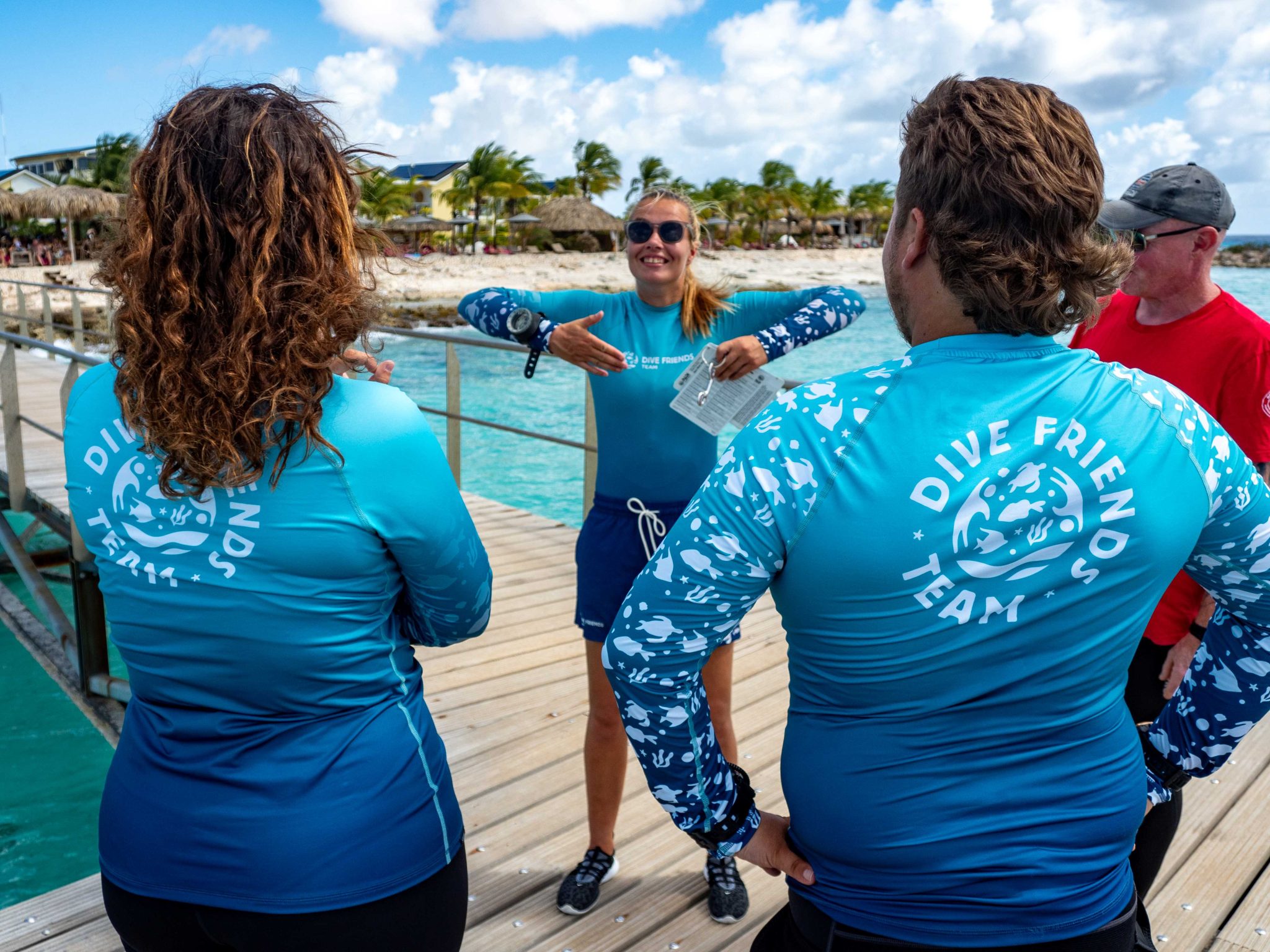
Dive Friends teaches the Instructor Development Course (IDC) several times a year to students who are eager to share their passion for diving with the world.
Dive Friends is known for the personal approach throughout the course. Their in-house course director will lead the students through every essential step, mentoring them to achieve their fullest potential as a dive instructor.
Applications for the following IDC start dates are now open:
- 12 April
- 5 July,
- 20 September
- 29 November
Partnership with Casita Palma
If the student opts for the IDC-Deluxe or IDC-Supreme package, their accommodation will be arranged for them at Casita Palma. This small and quiet resort is within walking distance from Dive Friends Bonaire’s main dive shop location and has everything you need to relax after an intense day of IDC training. Breakfast is included, so the student will always be fuelled and ready for their day.
Contact Dive Friends Bonaire’s Course Director Eddy for more information: coursedirector@divefriendsbonaire.com.
-

 News3 months ago
News3 months agoHone your underwater photography skills with Alphamarine Photography at Red Sea Diving Safari in March
-

 News3 months ago
News3 months agoCapturing Critters in Lembeh Underwater Photography Workshop 2024: Event Roundup
-

 Marine Life & Conservation Blogs2 months ago
Marine Life & Conservation Blogs2 months agoCreature Feature: Swell Sharks
-

 Blogs2 months ago
Blogs2 months agoMurex Resorts: Passport to Paradise!
-

 Blogs2 months ago
Blogs2 months agoDiver Discovering Whale Skeletons Beneath Ice Judged World’s Best Underwater Photograph
-

 Gear Reviews3 months ago
Gear Reviews3 months agoGear Review: Oceanic+ Dive Housing for iPhone
-

 Marine Life & Conservation2 months ago
Marine Life & Conservation2 months agoSave the Manatee Club launches brand new webcams at Silver Springs State Park, Florida
-

 News3 months ago
News3 months agoWorld’s Best Underwater Photographers Unveil Breathtaking Images at World Shootout 2023















